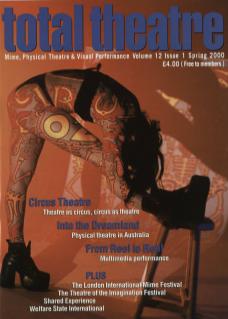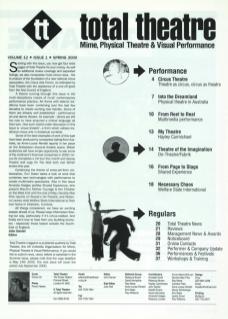Starting with this issue, you now get four extra pages of Total Theatre for your money. As well as additional review coverage and expanded listings, we also incorporate more circus news – the bi-product of the foundation of a new national circus association, the Circus Arts Forum, coordinated by Total Theatre with the assistance of a one-off grant from the Arts Council of England.
A theme running through this issue is the multi-disciplinary nature of much contemporary performance practice. Artforms with distinct traditions have been combining over the last few decades to create exciting new hybrids. Some of them are already well established – performance art and dance theatre, for example – others are still too new to have acquired a critical language all their own. One such hybrid under discussion in this issue is 'circus theatre', a form which utilises traditional circus arts in theatrical contexts.
Some of the best examples of work of this type have been produced by companies hailing from Australia, as Anne-Louise Rentell reports in her piece on the Antipodean physical theatre scene. British audiences will have ample opportunity to see some of the continent's foremost companies in 2000: Circus Oz completes a UK tour this month and desoxy Theatre and Legs On The Wall both visit British shores this year.
Continuing the theme of cross-artform collaboration, Emi Slater takes a look at work that combines new technologies with performance to create multimedia spectacles. Also in this issue Amanda Hodges profiles Shared Experience, who present Brecht's Mother Courage & Her Children on the West End until the end of May, Dorothy Max Prior reports on Russia's Do Theatre; and Rebecca Loukes visits Welfare State International at their new home in Ulverston, Cumbria.
All things considered, we have an exciting season ahead of us. Please keep information flowing our way, particularly if it's circus-related. And finally we'd love to hear from any budding reviewers, especially those based outside the South East of England.

